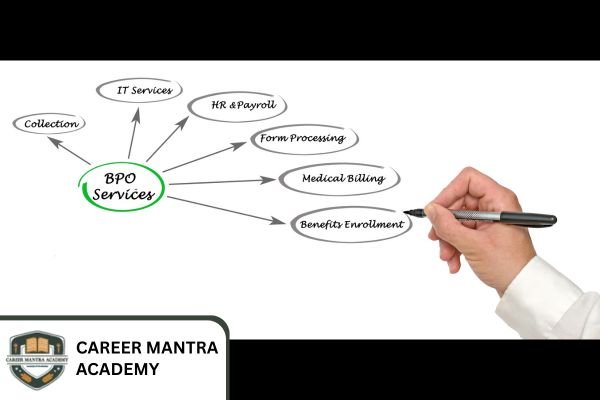What are the BPO skills?
To do well in the business process outsourcing industry, you need to have BPO skills. These include being able to talk to clients and customers, being able to solve problems to answer questions quickly, and being able to manage your time to meet deadlines. It’s also important to have technical skills like knowing how to use BPO tools, being good with computers, and typing quickly. In addition to these, soft skills like being able to adapt, work well with others, provide good customer service, be patient, and do more than one thing at once are very important for success and career growth in BPO.

For Applying BPO Course Click Here…
What are the most important BPO skills to build a successful career?
To have a successful career in BPO, you need to work on your communication skills, both written and spoken. This is because they help you deal with customers well. To solve problems quickly and build trust, you need to be able to listen actively and solve problems. Professionals can do a lot of things at once and manage their time well. You also need to know a lot about computers, be good at typing, and have good technical skills. These BPO skills are the most important for career success because they help you grow over time. Teamwork, adaptability, and patience are also important.
Why are communication skills considered the backbone of skills for BPO?
Communication skills are the most important part of BPO skills because the industry is all about talking to customers, clients, and teams in different parts of the world. Clear spoken and written communication helps you understand what your customers want, fix problems, and give them good service. Good communication also builds trust, clears up misunderstandings, and makes customers happier. Most BPO jobs involve voice processes, chat support, or email handling, so good communication has a direct effect on how well someone does their job. Even if you know a lot about technology, you won’t be able to do your job well if you don’t have good communication skills.
How can freshers develop the right skills for BPO careers?
A step-by-step version for freshers to develop the right BPO skills:
- Learn the basics – Understand BPO roles (voice, non-voice, back office).
- Improve communication – Practice speaking clearly, listening actively, and writing error-free emails.
- Work on typing & computer skills – Aim for 40+ WPM and learn basic MS Office/CRM tools.
- Build problem-solving skills – Learn to handle customer queries calmly and effectively.
- Practice time management – Prioritize tasks and multitask efficiently.
- Develop soft skills – Adaptability, patience, and teamwork are key.
- Do mock interviews & role plays – Practice real scenarios to gain confidence.
👉 With consistent practice, freshers can quickly build the right skills for BPO careers.

How do technical BPO skills improve performance at work?
Technical BPO skills help you do your job better by making things go faster, smoother, and more accurately. Employees can answer customer questions quickly and effectively if they know how to use a computer, type quickly, and know how to use CRM or ticketing software. Data entry skills and basic knowledge of MS Office make sure that reports and records are kept up to date. These technical skills cut down on mistakes, save time, and make people more productive. When you add soft skills to your technical BPO skills, you can consistently provide better customer service, meet deadlines, and reach performance goals.
How do time management and multitasking count as key BPO skills?
Time management and multitasking are important skills for BPO workers because they help them meet tight deadlines and handle a lot of tasks and customer questions at once. Good time management makes sure that work is done in order of importance and that service levels are met without stress. Professionals can answer calls, emails, or enter data at the same time while still being accurate thanks to multitasking. All of these skills work together to make people more productive, cut down on delays, and make customers happier. In a fast-paced BPO setting, being able to manage your time and do more than one thing at once will help you do better at work and move up in your career.
What future BPO skills will be in high demand?
In the future, BPO skills will be based on both technology and working with people. As automation and AI become more common, workers will need to know how to use digital tools, analyses data, and use CRM tools to run advanced systems. People will want to know how to use AI to help them talk to each other, handle process automation, and be aware of cybersecurity. Also, soft skills like emotional intelligence, adaptability, and problem-solving will always be important because machines can’t replace human empathy. The right mix of technical and soft skills in BPO will determine how well you do in your career in the future.
Future BPO skills that will be in high demand:
- Digital literacy – Comfort with automation tools, cloud platforms, and AI-based systems.
- Data analysis skills – Ability to read, interpret, and use customer and business data.
- CRM & advanced software expertise – Proficiency in modern customer relationship management tools.
- AI-assisted communication – Working alongside chatbots and AI tools to enhance customer service.
- Cybersecurity awareness – Understanding data protection and privacy compliance.
- Multichannel support skills – Handling voice, chat, email, and social media queries effectively.
- Emotional intelligence – Showing empathy and patience while solving customer issues.
- Adaptability – Adjusting to rapid technology changes and shifting customer needs.
- Problem-solving – Quick thinking to handle complex or unexpected issues.
- Leadership & collaboration – Managing teams and working across diverse cultures globally.
Give some top 10 BPO jobs from BPO skills?
| BPO Job Role | Description |
| 1. Customer Support Executive | Handles customer queries via calls, chat, or email. |
| 2. Technical Support Associate | Provides troubleshooting for software, hardware, or network issues. |
| 3. Data Entry Operator | Inputs and manages large volumes of data accurately. |
| 4. Telemarketing Executive | Promotes products or services through outbound calls. |
| 5. HR & Recruitment Associate | Manages hiring, employee records, and payroll in BPO processes. |
| 6. Finance & Accounting Analyst | Handles accounts, invoices, and financial reporting. |
| 7. IT Helpdesk Support | Assists employees/clients with IT-related problems and system support. |
| 8. Content Moderator | Reviews and filters user-generated content for compliance and safety. |
| 9. Quality Analyst (QA) | Monitors calls and processes to ensure service quality standards are met. |
| 10. Team Leader / Supervisor | Leads a team, tracks performance, and ensures targets are achieved. |
How do digital tools enhance modern BPO skills?
Digital tools improve modern BPO skills by speeding up, making smarter, and making processes more efficient. Employees can handle customer interactions more accurately and quickly with tools like CRM software, ticketing systems, and AI-powered chatbots. Collaboration tools make it easier for people to work together, and data analytics tools help people make decisions and keep track of their performance. Automation cuts down on repetitive tasks, which lets workers focus on solving problems and making customers happy. By learning how to use these digital tools, professionals can improve their BPO skills, stay competitive, and provide better service in an industry that relies on technology.
How can you improve your BPO skills for career growth?
You can get better at BPO and advance your career by working on both your technical and soft skills. To improve communication, start by practicing speaking, listening, and writing on a regular basis. Learn how to use CRM or other digital tools, as well as how to type faster and use a computer better. To do your job well, you need to learn how to solve problems, do more than one thing at once, and manage your time. Soft skills like being able to change, being patient, and working well with others are just as important.
You can improve your BPO skills even more by taking regular training, online courses, and mock practice sessions. This will help you grow in your career over time.
Conclusion.
The secret to beginning and advancing a prosperous career in the outsourcing sector is developing strong BPO skills. These abilities, which range from technical know-how and communication to problem-solving and flexibility, not only enhance day-to-day performance but also provide access to greater opportunities. Continuous learning and skill development are becoming even more crucial as the BPO industry changes due to automation and digital tools. Professionals can provide exceptional customer service, maintain their competitiveness, and advance their careers over the long term by concentrating on both technical and soft BPO skills.
What skills do you need for BPO?
To succeed in BPO, you need a mix of communication, technical, and soft skills. Strong verbal and written communication is essential for handling customers. Technical skills like computer proficiency, fast typing, and knowledge of CRM tools improve efficiency. Soft skills such as problem-solving, time management, adaptability, patience, and teamwork are equally important. Together, these skills help professionals manage customer queries effectively, meet deadlines, and deliver quality service, making them the foundation for a successful career in the BPO industry.
What is BPO in simple words?
BPO, or Business Process Outsourcing, is when companies hire another company to handle certain tasks or services for them. In simple words, it means giving some work—like customer support, data entry, accounting, or IT services—to an outside team so the main company can focus on its core business. For example, when you call customer care, many times it is answered by a BPO company working on behalf of the brand.
What are the types of BPO?
There are mainly three types of BPO, based on where the work is outsourced:
1. Onshore BPO – Services are outsourced to another company within the same country.
2. Nearshore BPO – Work is outsourced to a neighboring country with similar time zones.
3. Offshore BPO – Tasks are outsourced to a distant country, often for cost savings and 24/7 support.
Additionally, BPO can be categorized by function:
Front-office BPO (customer support, sales, telemarketing)
Back-office BPO (data entry, HR, finance, IT services)
What are five BPO services?
1. Customer Support – Handling calls, chats, and emails to assist customers.
2. Technical Support – Helping clients with software, hardware, or IT-related issues.
3. Data Entry & Management – Entering, processing, and maintaining business data.
4. Human Resources (HR) Services – Recruitment, payroll, and employee record management.
5. Finance & Accounting – Managing invoices, bookkeeping, and financial reporting.
Which country is best for BPO?
The best country for BPO depends on cost, talent, and infrastructure, but some countries consistently lead the global outsourcing market:
Top Countries for BPO
1. India – The global leader in BPO, known for skilled English-speaking talent, cost efficiency, and IT expertise.
2. Philippines – Famous for voice-based BPO services due to excellent English communication and cultural alignment.
3. China – Strong in IT, finance, and back-office outsourcing with advanced infrastructure.
4. Malaysia – Popular for multilingual BPO services, especially in finance and customer support.
5. Mexico – A nearshore option for U.S. companies, offering bilingual talent and similar time zones.
6. Poland – Leading BPO hub in Europe, known for finance, accounting, and multilingual support.
